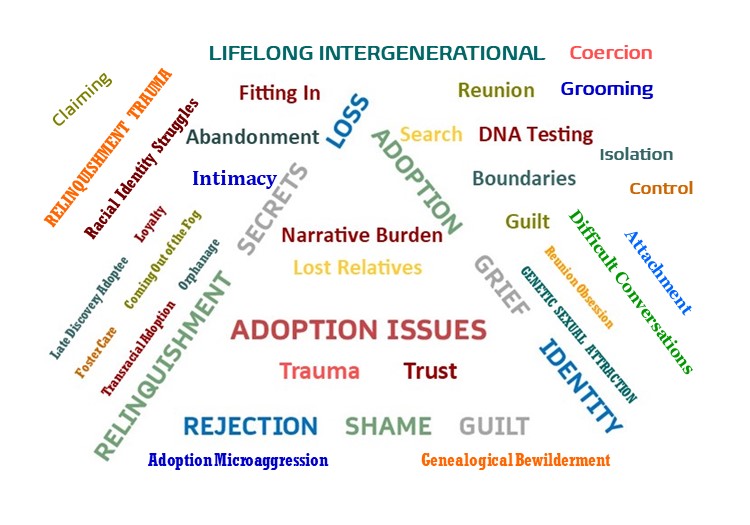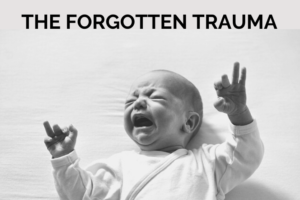Adoption Competency Definition
Adoption competency is the term used to describe:
- a mental health clinician that has studied adoption and relinquishment issues and uses evidenced-based therapy for adoption triad members (adoptees, birth parents, adoptive parents)
- a professional development training program that trains mental health professionals on relinquishment and adoption’s impact on adoption triad members and evidence-based therapy techniques.
Mental health professionals and professional development training programs give themselves the adoption competency label. There is no national association of adoption competent therapists that has a definition of adoption competency, curriculum, or training for mental health professionals to complete to become adoption competent. With no evidence-based core curriculum for clinical work with all three members of the adoption triad -adoptees (youth and adults), birth family, and adoptive families, every mental health professional or adoption competency training program is free to call themselves adoption competent. There are “adoption competency training” programs for mental health professionals that referred to their program as evidenced-based training. Based on a review of the adoption curriculum by this author, these adoption competency training programs focus solely on adoption issues for youth and their adoptive families. This author is unaware of an adoption competency curriculum that includes training on working with birth families, adults who were adopted, and relinquishment trauma. It is not that the adopted youth-focused training programs are not informative, but in this writer’s opinion, to be truly adoption competent, adoption competency training programs should have training on working with birth parents and adult adoptees in addition to working with adopted youth and their families.
This blog post is a brief description of the author’s views on adoption competency education and training with the goal to help adoption triad members (adoptees, birth parents, adoptive parents) and their extended families (adoption constellation) make informed decisions on choosing an adoption competent therapist.
The Basics of Adoption Competency
A mental health professional with clinical training on adoption issues understands adoptees, birth parents, and adoptive parent’s history (pre and post-adoption traumas) needs to be taken into greater consideration when doing an adoption sensitive assessment. Pre-adoption traumas include fetal alcohol exposure, neglect, abuse, orphanage, and foster care. Post-adoption traumas include psychological abuse when an adopted person was raised “as if” they were born into their adoptive family and birth parent being treated “as if” they did not lose a child to adoption. Visit the core issues of adoption webpage for a more detailed discussion of post-adoption issues for adoption triad members.
To truly understand an adoption triad members’ lived experience and to earn their trust, professionals need to understand society and the business of adoption’s role in creating and reinforcing the trauma(s). When adoption is treated as a transaction between families, with a disregard for family permanency, transracial adoption issues, sealed records (to name a few) trauma often results. When a mental health professional does a clinical assessment with a birth parent the assessment should inquire if a birth mother was sent away, coerced, or groomed to relinquish their child, or not given options counseling. When working with an adoptive parent the mental health professional should inquire if the parent believes society’s misperceptions that a child is disloyal for wanting to talk about birth family or how they are impacted by being adopted. Discussion with the adopted person should include how they have been impacted by having no contact with their first family and having their records sealed.
Mental health professionals need to understand the big T traumas and little t traumas[1] have an enormous impact on the brain and body of first parents, adopted persons, and adoptive parents. This author believes adoption traumas are made worse by not acknowledging the impact of relinquishment, adoption microaggressions, and other adoption traumas (i.e. transracial adoption, late discovery adoption). Adoptive families are more complicated than families with biological children. Birth families do not go on with their lives as if relinquishment did not have an impact on them. Many first mothers have post-traumatic stress disorder from the relinquishment and how they were treated. Thus, a short-term behavior focused assessment/treatment plan is often not appropriate for adoption triad members with trauma histories.
Key to understanding the lifelong journey of being a birth parent, adopted person and adoptive parent is understanding the core issues of adoption[2]. The core issues of adoption paradigm states while there may be positives in adoption there are also losses experienced by all adoption constellation members – birth parents, adoptees, and adoptive parents and their extended families. From the losses, additional core issues may be experienced by adoption triad members. Other core issues are rejection, abandonment, grief, identity, guilt, shame, loyalty, fitting in, intimacy, control, claiming, and entitlement. How much a core issue affects an individual depends upon their personality and life experiences. Depression can be a normative response to the enormous losses felt by an adoptee or birth parent. Some adoptive parents may grieve as they process losses related having a child that is not a birth child and adoptive families have unique complexities. The assessment an adoption competent therapist does with a depressed adoption triad member would have a different focus and might use a wider range of interventions than a traditionally trained mental health professional.
A birth parent should be evaluated for post-traumatic stress disorder and complex post-traumatic stress disorder due to relinquishment and how they were treated pre and post placement. Birth parents with crisis pregnancies have often been shamed and isolated which makes the trauma of relinquishment worse. Adopted persons should be evaluated for post- traumatic stress disorder and complex post-traumatic stress disorder. Many adoptees have an elevated risk for PTSD, anxiety, and depression due to birth mother’s experiencing trauma during their pregnancy. When adopted persons are raised in families do not acknowledge the lived experience of being an adopted person it adds additional stress experiences.
An adoption therapist will evaluate the level of attachment a child has with their adoptive parents. Children who were neglected, abused, spent time in orphanages, or in foster care may not be attached to their parents the same as children who have not experienced trauma. Thus, an adoption competent therapist would not assume a poor relationship between a child and an adoptive parent is always the result of current family dynamics. An assessment would be done on the child’s early history as well as the adoptive parent’s attachment style. Assessments of children often include an evaluation of harmful prenatal alcohol, drug exposures, or starvation as an infant. An adoption competent therapist would not assume a child’s misbehavior is willful disobedience, but possibly a result of brain injury due to early childhood adverse experiences. Adoptees with significant difficulties should be evaluated for relinquishment trauma a form of developmental trauma[3].
An adoption therapist understands a birth parent may struggle with I am parent even if I am not the parenting parent. Individuals who were adopted need to figure out how they are like their birth parents, their adoptive parents, and characteristics unique to them. Identity issues are more complex when children are of a different race than their adoptive parents. Identity also needs to be reassessed after adoption reunions.
Today it is common for birth relatives and adoptive families to have contact after adoptions are finalized. Yet there are very few role models and mentors on open adoption relationships available to adoption constellation members. An adoption competent therapist understands the complexity of open adoption relationships and the diversity of these relationships.
Adoptions that were closed (no contact between birth family and adoptee are being opened all the time. Sometimes this happens extremely fast with direct-to-consumer DNA tests, the Internet, and social media. An adoption competent therapist with training on adoption search and reunion can help an individual prepare emotionally for an adoption reunion before making contact as well as provide insight and guidance for complicated adoption reunion relationships. Additionally, adoption competent therapists should have insight on the impact of relinquishment trauma and genetic sexual attraction on birth parents and adoptees in reunion.
While there are more similarities than differences between parenting children that were born into families and adoptive families there are differences. Adoptive parents may take their child’s need to talk about birth family as rejection. Adoptive parents also need to figure out how to explain difficult birth histories to their children. An adoption therapist understands there are additional complexities to adoptive parenting.
Adoptive parents may not know how to talk to their minority child about racial issues or know to promote a positive racial identity in their child. Parents frequently find it easier to teach their child about culture (food, traditions, music, history) than the more complex racial issues of prejudice, stereotypes, and white privilege. An adoption professional can educate an adoptive parent on how to help their child develop a positive racial identity and how to deal with racism, stereotypes, and white privilege.
Individuals seeking help with attachment and trauma should talk to a prospective therapist not only about their adoption issues training but also has training on attachment therapy and trauma therapy. This is extremely important because the brain and body have been impacted by trauma[4] and talk therapy alone may not only be unhelpful but harmful. A therapist could be adoption competent but not trauma or attachment competent.
Why it is difficult to find a mental health professional that knows adoption issues
The majority of social work and mental health professionals’ graduate degree programs do not include training for clinicians on the impact of relinquishment and adoption on adoption constellation members (birth parents, adoptees, adoptive parents, and their relatives). The lack of graduate adoption competency training often leads otherwise knowledgeable mental health professionals to believe they are an adoption competent therapist when they have had no clinical training on relinquishment and adoption issues. The situation is made worse when mental health professionals believe the misinformation society has promoted about adoption. This often results in harmful advice to adoption triad members. Adoptive parents have been told to raise their children “as if” they were born into their family and if their child asks about their birth family the adoptive parents must be doing something wrong. Birth parents have been told to not think about their child lost to adoption and move on with their life. Adoptees have been told they are disloyal if they want to contact their birth family. Adoptive parents seeking support for their acting-out children have been told to give their child back by their therapist. While some mental health professionals without adoption training may have a natural understanding of complex adoption issues, a mental health professional with adoption issues training will more likely have a greater knowledge base for working with adoption triad members.
Ideally, an adoption-competent therapist would have training specific to trauma treatment. This should include using a treatment framework of the three stages of treatment for complex PTSD and have training in at least one evidence-based trauma therapy. Stage 1 of complex post-traumatic stress treatment includes learning stress management techniques. If a trauma survivor has a dissociative diagnosis in addition to a post-traumatic stress disorder diagnosis, the psychotherapist should have training in the treatment of dissociative disorders.
When interviewing a prospective adoption therapist, individuals should ask prospective therapists for details on where they got their adoption competency training (adoption conferences, adoption books, professional development workshops, and research) as well as training on the treatment of trauma disorders.

Trauma-informed therapies utilize both top-down psychotherapy techniques and and bottom-up psychotherapy techniques.
Adoption Competency Resources
- A Need To Know: Enhancing Adoption Competency Among Mental Health Professionals, Donaldson Adoption Institute2013_08_ANeedToKnow Donaldson Competency
- Selecting And Working With A Therapist Skilled In Adoption, Child Welfare Information Gateway
- The Importance of Using an Adoption Competent Therapist Adoption Network Cleveland
Attachment and Trauma Resources
- van der Kolk, B. (2014). The Body Keeps the Score- Brain, Mind, and Body in the Healing of Trauma. Viking
- Attachment and Trauma Network https://www.attachmenttraumanetwork.org/parenting/
- Dyadic Developmental Psychotherapy https://ddpnetwork.org/about-ddp/dyadic-developmental-psychotherapy/
- Trust Based Relational Intervention, Kayrn Purvis Institute of Child Development https://child.tcu.edu/about-us/tbri/#sthash.oMDCAPG7.dpbs
Footnotes
[1] Shapiro, F. (2018). Eye Movement Desensitization and Reprocessing (EMDR) Therapy 3rd edition Basic Principles, Protocols, and Procedures, The Guildford Press
[2] Roszia, S. K., Maxon, A. D. (2019). Seven Core Issues in Adoption and Permanency, Jessica Kingsley Publishers
[3] van der Kolk, B. A. (2005). Developmental Trauma Disorder Toward a rational diagnosis for children with complex histories, Psychiatric Annals, 35(5), 401-408.
[4] van der Kolk, B. (2014). The Body Keeps the Score- Brain, Mind, and Body in the Healing of Trauma. Viking
Disclaimer: While Marie hopes that you find the information on her website useful and informative please note- the information contained in this website is for general information purposes only. There are no representations or warranties of any kind, express or implied, about the completeness, accuracy, reliability, suitability, or availability with respect to the resources listed on the website or the information, services, or related graphics contained on the resources listed on her website. Any reliance you place on such information is therefore strictly at your own risk. The website has links to other websites which are not under the control of Marie Dolfi, LCSW. Marie has no control over the nature, content, and availability of those sites. The inclusion of any links does not necessarily imply a recommendation or endorse the views expressed within them.


